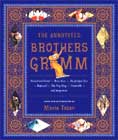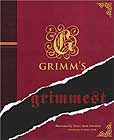| Introduction | Annotated Tales | eBooks | Bookstore | Illustration Gallery | Discussion Board | Blog |
 |
|
|
Stories about Snakes First Story THERE was once a little child whose mother gave her every afternoon a small bowl of milk and bread, and the child seated herself in the yard with it. When she began to eat however, a snake came creeping out of a crevice in the wall, dipped its little head in the dish, and ate with her. The child had pleasure in this, and when she was sitting there with her little dish and the snake did not come at once, she cried, "Snake, snake, come swiftly Then the snake came in haste, and enjoyed its food. Moreover it showed gratitude, for it brought the child all kinds of pretty things from its hidden treasures, bright stones, pearls, and golden playthings. The snake, however, only drank the milk, and left the bread-crumbs alone. Then one day the child took its little spoon and struck the snake gently on its head with it, and said, "Eat the bread-crumbs as well, little thing." The mother, who was standing in the kitchen, heard the child talking to someone, and when she saw that she was striking a snake with her spoon, ran out with a log of wood, and killed the good little creature. From that time forth, a change came over the child. As long as the snake had eaten with her, she had grown tall and strong, but now she lost her pretty rosy cheeks and wasted away. It was not long before the funeral bird began to cry in the night, and the redbreast to collect little branches and leaves for a funeral garland, and soon afterwards the child lay on her bier. Second Story An orphan child was sitting on the town walls spinning, when she saw a snake coming out of a hole low down in the wall. Swiftly she spread out beside this one of the blue silk handkerchiefs which snakes have such a strong liking for, and which are the only things they will creep on. As soon as the snake saw it, it went back, then returned, bringing with it a small golden crown, laid it on the handkerchief, and then went away again. The girl took up the crown, it glittered and was of delicate golden filagree work. It was not long before the snake came back for the second time, but when it no longer saw the crown, it crept up to the wall, and in its grief smote its little head against it as long as it had strength to do so, until at last it lay there dead. If the girl had but left the crown where it was, the snake would certainly have brought still more of its treasures out of the hole. Third Story A snake cries, "Huhu, huhu." A child says, "Come out." The snake comes out, then the child inquires about her little sister: "Hast thou not seen little Red-stockings?" The snake says, "No." "Neither have I." "Then I am like you. Huhu, huhu, huhu." NOTES I. From Hesse, but belongs to several places. The ringed snake (Coluber natrix) which likes milk and is not poisonous, is the snake which is meant. Compare Schubert's Naturgeschichte, p. 196. There is a similar story in Ziska, p. 51. A story in the Gesta Romanorum, chap. 68 (under No. 11), is clearly related to this. A knight becomes poor, and is very sorrowful about it. Then a snake, which has lived for a long time in a corner of his room, begins to speak, and says, "Give me some milk every day, and set it ready for me yourself, and I will make you rich." So the knight brings the milk for it every day, and in a short time he becomes rich again. The knight's foolish wife, however, advises him to kill the snake for the sake of the treasures which are sure to be found in its hole. So the knight takes a bowl of milk in one hand, and a hammer in the other, and goes with them to the snake, which glides out of its hole to enjoy the milk. While it is drinking, he raises the hammer, but instead of hitting the snake strikes the bowl violently, on which the snake at once hurries away. From that day forth his property begins to decrease as much as it had increased before. He entreats the snake to take him into favour again, but it says, "Dost thou think that I have forgotten the blow which the bowl received instead of my head? There can be no peace between us!" Then the knight continues in poverty all the days of his life. The same story is in Mone's Anzeiger, 1837, pp. 174, 175. Another story from Switzerland, The Queen of the Snakes (Deutsche Sagen, 1. 220), also belongs to this group. A poor shepherd-girl becomes prosperous because she gives milk to a snake which is dying of hunger. II. From Hesse. According to another story, in a certain farm the daughter of the house had the task of milking the cows which were in the fields, and for this purpose usually drove them into a shed or cow-house. Once when she was milking, a great snake crept out from beneath the boards. The girl filled a little trough, into which she often poured milk for the cats, with milk, and set it before the snake, which drank the whole of it. This she did daily, and even in winter. When the girl was married, and all the guests were sitting happily at table, the snake unexpectedly came into the room and laid down before the bride a valuable crown of gold and silver as a mark of its gratitude. A Tyrolese version in Zingerle, p. 106, agrees with this, and the Story of the Snake Queen in Vonbun, pp. 21, 22, is closely allied. In Lower Lusatia (Büsching's Wöchentliche Nachrichten, 3. 343, 345) it is believed that there is a water snake-king who wears a crown on his head which is not only valuable in itself, but also brings great riches to its possessor. On a sunny May day a certain man ventures to spread out a great white sheet on a green plot in front of the castle of Lübenau, for the Snake King is fond of putting his crown down on pure white things, and then playing with the other snakes. Hardly has the man spread the sheet when the King appears, puts his crown on it, and then goes away to play with the snakes. And now the man comes softly thither (on horseback in order to escape the quicker), seizes the sheet on which the crown is lying, by the four corners, and gallops off. He hears the shrill whistling of the snakes behind him, but escapes by the speed of his horse. The possession of the precious crown soon makes him enormously rich. III. From Berlin. Grimm, Jacob and Wilhelm. Household Tales. Margaret Hunt, translator. London: George Bell, 1884, 1892. 2 volumes. Return to Household Tales by Jacob and Wilhelm Grimm |
|
| ©Heidi
Anne Heiner, SurLaLune Fairy Tales E-mail: heidi@surlalunefairytales.com Page created 10/15/06; Last updated 10/28/07 www.surlalunefairytales.com |














